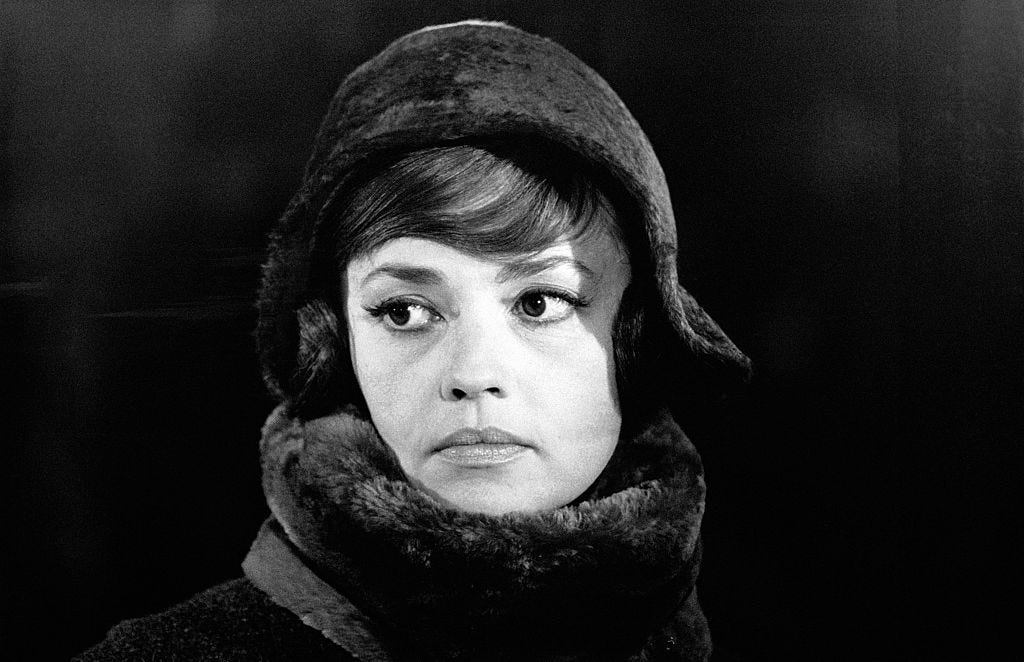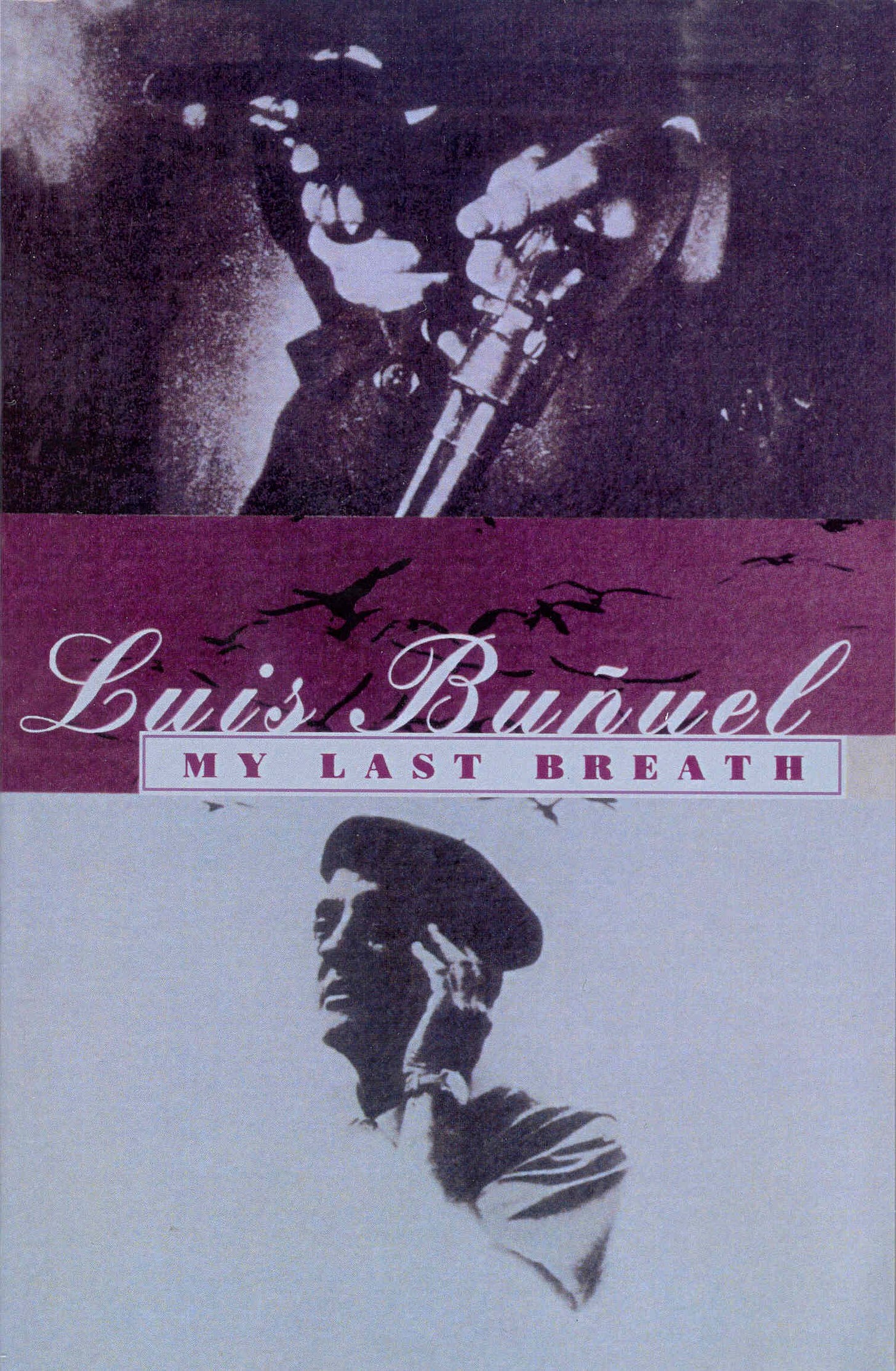One of the things that has kept me sane during the pandemic is that I’ve held a sort of private film festival for myself, re-watching the classic movies that made me fall in love with the cinema long ago, and watching some of the new stuff that has taken over the movies these days – so, everything from The Leopard and Pather Panchali to Avengers: Endgame and Black Widow. I’m going to be thinking aloud about all these movies here pretty regularly, and maybe about TV shows too, because I’ve watched my share of those too – including The Mandalorian, The Last Dance, WandaVision, Lupin, Call My Agent, Star Trek: Picard, and Ted Lasso. Today, just to make a beginning, I have a few stories to tell about one of my favorite film directors, Luis Buñuel. I’m not sure which of his movies is my favorite. It’s a close-run thing between The Discreet Charm of the Bourgeoisie and The Exterminating Angel. But nobody who watches Un Chien Andalou will ever forget the cut between a thin cloud sliding across the full moon and a razor blade slicing across a woman’s eyeball.
I once had the good fortune to be seated next to the great French movie star Jeanne Moreau at a lunch in her honor. I asked her if she could say something about Buñuel, with whom she had worked on The Diary of a Chambermaid.
“Oh, Don Luis!” she cried in her celebrated deep voice. “I love him. I said to him once, ‘oh, Don Luis, if only I was your daughter!’ And he said, ‘No, my dear, you should not wish it, because if I was your father I would lock you up and you would never be in the motion pictures.’”
(Moreau told a never-ending stream of great stories at that lunch. In one of my next posts, when I’ll be talking about François Truffaut, I’ll tell you her tale about Jules et Jim.)
Buñuel never made a Hollywood movie but he did spend some time in L.A. and one year at Christmas he was invited to a festive dinner at the home of a friend. One of the guests was Charlie Chaplin. He went, along with his pal and fellow Surrealist, the screenwriter Eduardo Ugarte, and at a certain point during the meal they decided some sort of Surrealist disruption to the proceedings was in order. They got up and seriously, even gravely, took all the decorations off the Christmas tree, arranged them around the foot of the tree, bowed, and took their leave. Unexpectedly, a short time afterwards, Buñuel was invited to dinner at the Chaplin household. When he arrived Chaplin greeted him warmly, and asked him to come into a side room for a moment. In that room there was a fully decorated Christmas tree.
“Since you’re so fond of tearing up trees, Buñuel,” Chaplin said, “why don’t you get it over with now, so we won’t be disturbed during dinner.”
This story and many others can be found in Buñuel’s autobiography, My Last Breath, which I recommend highly. It’s the funniest self-portrait of an artist you will ever read.
In My Last Breath Buñuel explains why the perfect dry martini is like the Immaculate Conception of Christ. To make the perfect dry martini, he explains, you must take a martini glass, place an olive in it, and fill it to the brim with gin. Then you must place a bottle of vermouth near the glass, positioned so that a single shaft of sunlight passes through the bottle and strikes the glass. After that you can drink the martini.
On May 12, 1960, L’Express in France published an interview between Buñuel and Michèle Manceaux. Here’s a piece of it.
Translation:
- But what is your attitude now regarding the Catholic faith?
- I don’t have an attitude. I was brought up in it. I could answer, “I’m still an atheist, thank God.” I believe one must search for God within Man. It’s a very simple attitude.
Seventeen years later, he changed his mind, and told The New Yorker:
“I’m not a Christian, but I’m not an atheist either. I’m weary of hearing that accidental old aphorism of mine, ‘I’m an atheist, thank God.’ It’s outworn. Dead leaves.”
*
Myself, I’m fond of those dead leaves. If I publish a novel or a story one day titled Thank God, I’m an atheist, don’t be surprised.
*
A postscript on Mr Chaplin:
In the early 1970s I was in a taxi in Soho, London, when all of a sudden the driver screeched to a halt and said, “Get out.”
“But we’re not there yet,” I said.
“Get out now,” he repeated, emphatically.
I was annoyed and refused to pay him. He didn’t care, and as soon as I was out of the cab he took off at high speed and screeched to a halt about a hundred yards down the road.
There was an elegant lady waiting there, with an elderly gentleman in a wheelchair, with a blanket across his lap. I realized that they were Oona O’Neill and her husband, Charles Chaplin.
I totally understood what the cabbie had done. In his place, if I’d had the chance to have Chaplin in my car, I’d have done the same thing.
He had no idea who I was, of course – I was nobody, had published nothing – but if he had known it would have improved the story he would tell to future riders in his cab.
“I had that Salman Rushdie in the back of the cab once, but I threw him out so I could pick up Charlie Chaplin.”
True story.








I can't believe that THE Salman Rushdie is writing on his blog and I, this little I, is appending a comment.
O M G!
The cabbie who kicked Salman Rushdie out to pick up Charlie Chaplin is like that joke where the Pope mobile is in the shop and as the Pope is riding around in a limo, he convinces the driver to let him take the wheel while the driver sits in the back. Two police officers pull the limo over for speeding but the cop who has gone to get the license and registration comes back with nothing, and the partner asks what's up -- "I don't know who's in that limo but the Pope's their driver," the cop says.